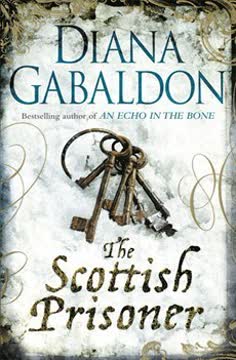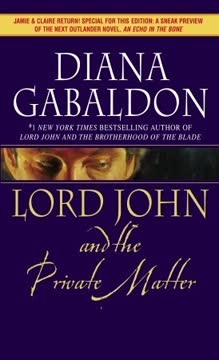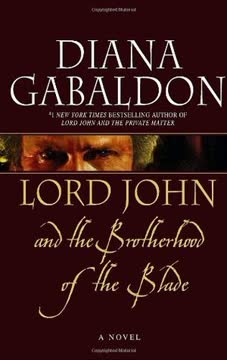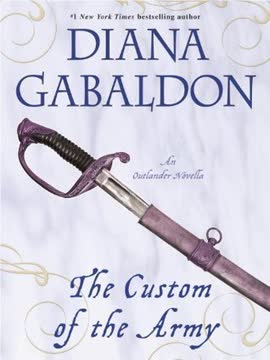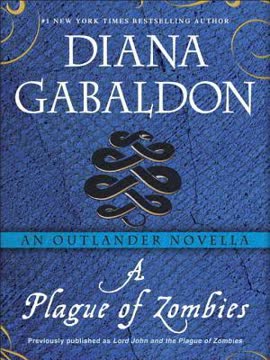Plot Summary
Prisoners of Past Wars
Jamie Fraser, a paroled Jacobite prisoner, toils as a groom at Helwater, haunted by memories of Culloden and the family he lost. His dreams are filled with longing for his wife Claire and the son he's never met. Meanwhile, Lord John Grey, a British officer, is also marked by war and secrets, his life shaped by duty and forbidden desires. Both men are prisoners—Jamie by circumstance, John by the expectations of his class and the shadow of his sexuality. Their paths, once crossed in Ardsmuir prison, are about to converge again, as the unfinished business of the past refuses to stay buried. The emotional weight of guilt, longing, and the struggle for redemption sets the stage for a story where the past is never truly past.
The Green Branch Beckons
Tobias Quinn, an Irishman and former Jacobite comrade, seeks out Jamie at Helwater, bringing with him the seductive promise of a new rising. He speaks of the "green branch" that will flower—an Irish plot to restore the Stuarts, fueled by the legend of the Druid king's cup, a symbol of sovereignty. Quinn's presence is both a comfort and a threat, awakening Jamie's buried loyalties and the trauma of failed rebellion. The Cause, thought dead, flickers with new life, but Jamie is wary. He knows too well the cost of hope and the price of leadership. Quinn's proposal is a test of Jamie's identity: is he still the man who led men to war, or has he become something else in exile and servitude?
Secrets in the Shadows
In London, Lord John Grey receives a packet of damning evidence from a dying comrade, Charles Carruthers. Among the documents is a mysterious poem in Irish, hinting at a secret code and a conspiracy involving Major Siverly, a corrupt officer. The poem's meaning eludes John and his brother Hal, but its presence is a fuse waiting to be lit. The Greys' investigation is personal—Carruthers's deathbed charge is a call for justice, and the shadow of the Twelvetrees family, old enemies, looms over their efforts. The poem, the "Wild Hunt," becomes a symbol of the hidden forces at play, drawing John and Jamie inexorably toward each other and the heart of a new plot.
The Fuse Is Lit
Hal, seeking answers, has Jamie brought to London under guard, forcing him into the Greys' investigation. Jamie's knowledge of Irish and his past connections make him indispensable, but also a pawn. The two men, bound by mutual respect and old wounds, are thrust together to decipher the poem and expose Siverly's crimes. Their uneasy alliance is fraught with tension—old resentments, unspoken desires, and the ever-present threat of betrayal. As they follow the trail of the Wild Hunt, the lines between duty, loyalty, and personal survival blur. The fuse is burning, and both men sense that the explosion will change everything.
Ghosts and Guilt
Jamie's nights are tormented by dreams of Culloden, lost comrades, and the faces of those he failed to save. The guilt of survival, the burden of leadership, and the memory of violence are scars that never heal. John, too, is haunted—by the memory of lost lovers, the shame of forbidden love, and the knowledge that justice is rarely pure. Their shared experience as soldiers and survivors creates a bond, but also a gulf of pain. The ghosts of the past are not silent; they shape every choice, every hesitation, and every act of courage or cowardice. The search for Siverly becomes a journey through their own haunted hearts.
The Irishman's Proposal
Quinn reveals the full scope of the Irish conspiracy: a plan to use the Druid king's cup to legitimize a Stuart invasion, with Jamie as the chosen leader. The cup, a relic of ancient power, is both a symbol and a weapon. Quinn's faith in Jamie is absolute, but Jamie recoils from the role. He knows the cost of failed causes and the blood price of destiny. Yet the pull of the past, the call of loyalty, and the hope of redemption are hard to resist. The proposal is not just political—it is existential, forcing Jamie to confront who he is and what he owes to the dead, the living, and himself.
London's Tangled Web
In London, the Greys' investigation deepens. Siverly is implicated in corruption, murder, and possibly treason. The poem's code points to a network of conspirators—the Wild Hunt—hidden within the army and the Irish Brigades. Twelvetrees, an old enemy, is entangled in the plot, and the lines between friend and foe blur. Jamie and John, forced to work together, navigate a world of spies, double agents, and shifting allegiances. The city is a labyrinth of secrets, and every step brings them closer to danger. The tension between personal loyalty and public duty grows, as both men realize that justice may demand a terrible price.
Oaths and Obligations
Jamie's status as a paroled prisoner is both a shield and a shackle. The Greys use his honor against him, compelling his cooperation with the threat of imprisonment or worse. The question of oaths—sworn to king, country, family, and self—becomes central. What does a man owe to his word, and what happens when oaths conflict? John, too, is bound by duty, to his brother, his regiment, and the memory of Carruthers. Both men are forced to choose between competing loyalties, knowing that every choice is a betrayal of something or someone. The cost of freedom is measured in broken promises and the weight of conscience.
The Wild Hunt's Code
The cryptic poem is revealed as a code, a means for conspirators to recognize each other and signal the start of the plot. The Wild Hunt is not just a legend—it is a living network of Jacobite sympathizers, ready to strike. The search for Siverly leads Jamie and John to Ireland, where the past is never far away and every ally may be a traitor. The cup, the poem, and the plot converge, and the true stakes become clear: not just personal redemption or revenge, but the fate of nations. The hunt is on, and all heads turn as the Hunt goes by.
Blood and Betrayal
Violence erupts: Siverly is murdered, and suspicion falls on John. The web of intrigue tightens, and old enmities flare. Jamie and John must escape pursuit, clear their names, and expose the true traitors. The cost is high—friends are lost, and the line between justice and vengeance blurs. The duel with Twelvetrees is both a personal reckoning and a public spectacle, where honor and survival are at stake. Blood is spilled, and the bonds of trust are tested to the breaking point. In the end, betrayal comes not just from enemies, but from the demands of duty and the impossibility of perfect loyalty.
Tithes to Hell
Quinn, the true believer, is driven to despair by the collapse of the plot. His suicide, a "teind" or tithe to hell, is both a personal tragedy and a symbol of the cost of fanaticism. Jamie, sole witness and mourner, buries his friend and the Druid cup, laying to rest the ghosts of the past. The price of loyalty is paid in blood and sorrow, and the lesson is clear: the old ways, the old causes, demand sacrifices that can never be repaid. The Wild Hunt has claimed its tithe, and the survivors are left to count the cost.
The Price of Loyalty
The court-martial of Siverly is both a triumph and a tragedy. Justice is done, but at the cost of innocence and peace of mind. John learns that Twelvetrees, far from being a traitor, was a double agent, and the weight of unintended consequences crushes him. Jamie, too, is burdened by guilt—the knowledge that every choice is a betrayal of someone. The price of loyalty is never simple, and the reckoning is never complete. Both men are changed, marked by what they have done and what they have failed to do. The search for justice becomes a search for forgiveness.
Succession and Sacrifice
The death of George II and the succession of George III mark the end of an era. The old king is buried with pomp, and the new king ascends, but the real succession is quieter: the passing of burdens, hopes, and responsibilities from one generation to the next. Jamie, returning to Helwater, finds peace in the rhythm of daily life and the love of his son William, even as he remains a prisoner. John, named guardian to William, accepts the weight of duty and the knowledge that the future is always uncertain. Sacrifice is the price of continuity, and the world moves on.
The Fog Descends
A sudden fog on the fells becomes a metaphor for the uncertainty and danger that haunts all the characters. William, lost and found, becomes the symbol of hope and the possibility of redemption. Jamie's love for his son, and his willingness to sacrifice his own freedom for William's sake, is the heart of the story. The search for home, for belonging, and for peace is never-ending, but in the end, it is the small acts of love and courage that matter. The fog lifts, but the scars remain.
Gambits and Goodbyes
As John prepares to leave Helwater, he and Jamie share a final moment of connection—a chess gambit, a gesture of mutual respect and understanding. The possibility of friendship, of something enduring beyond the roles of prisoner and gaoler, is left open. Goodbyes are never final; the bonds forged in suffering and shared struggle endure. Both men have lost much, but they have also gained something: the knowledge that even in a world of betrayal and loss, trust and loyalty are possible.
The Enduring Bond
In the quiet of Helwater, Jamie finds solace in the love of his son and the memory of those he has lost. John, in London, finds comfort in friendship and the hope of forgiveness. The story ends not with triumph or despair, but with the enduring bond between two men who have survived the worst the world can offer. The past is never truly past, but neither is it the end. In the darkness, there is always the hope of peace, and the knowledge that love endures.
Characters
Jamie Fraser
Jamie Fraser is a man marked by war, loss, and the burden of leadership. Once a laird and Jacobite hero, he is now a paroled prisoner, living under an assumed name as a groom at Helwater. His psyche is shaped by guilt—over the men he led to death at Culloden, the family he cannot protect, and the wife and child lost to time. Jamie's sense of honor is both his strength and his torment; he is bound by oaths, loyalty, and the memory of failed causes. His relationship with John Grey is complex—rooted in mutual respect, tinged with resentment, and shadowed by the possibility of forbidden friendship. Jamie's journey is one of reluctant involvement, forced to confront the ghosts of his past and the demands of the present. His love for his son William is the secret at the heart of his endurance, and his ultimate sacrifice is to choose loyalty to the living over the dead.
Lord John Grey
John Grey is a British officer, a man of principle and intellect, but also a prisoner of his own secrets. His homosexuality, forbidden by law and custom, shapes his relationships and his sense of self. Haunted by the loss of lovers and the demands of duty, John is driven by a need for justice and a longing for connection. His bond with Jamie Fraser is fraught—part adversary, part ally, part unspoken love. John's investigation into Siverly's crimes is both a quest for justice and a way to honor the memory of his friend Carruthers. He is a man who seeks to do right, even when the cost is high, and his journey is one of self-discovery, guilt, and the hope of forgiveness. John's willingness to risk everything for honor and friendship is both his greatest strength and his deepest vulnerability.
Tobias Quinn
Tobias Quinn is the embodiment of the true believer—a man whose faith in the Jacobite cause is absolute, even in the face of repeated failure. Charismatic, persuasive, and relentless, Quinn is both a friend and a threat to Jamie. He brings with him the promise of a new rising, the lure of destiny, and the danger of fanaticism. Quinn's inability to let go of the past, his willingness to sacrifice everything for the Cause, and his manipulation of symbols like the Druid king's cup make him both tragic and dangerous. His suicide, a "teind" or tithe to hell, is the ultimate expression of the cost of failed causes and the peril of unyielding belief.
Hal Grey (Duke of Pardloe)
Hal Grey is the driving force behind the investigation into Siverly and the Wild Hunt. As John's older brother and a powerful figure in the army, Hal is both protector and manipulator. His sense of honor is absolute, but his methods are often ruthless—he is willing to use Jamie as a pawn, to bend the rules, and to risk scandal for the sake of justice. Hal's relationship with John is complex, marked by loyalty, rivalry, and the shared burden of family secrets. His marriage to Minnie, a former spy, adds another layer of intrigue. Hal's development is one of increasing awareness of the cost of his actions, and his willingness to admit fault is both rare and significant.
Edward Twelvetrees
Edward Twelvetrees is a man caught between worlds—a soldier, a friend, and ultimately a double agent working to suppress Jacobite plots. His involvement with Siverly and the Wild Hunt is both a matter of duty and personal conviction. Twelvetrees's actions are driven by a sense of honor, but also by the need to protect his family's name and legacy. His death in a duel with John is both a personal tragedy and a symbol of the impossibility of perfect loyalty. Twelvetrees is a victim of the very system he serves, undone by secrets, misunderstandings, and the relentless demands of duty.
Minnie Grey
Minnie Grey, Hal's wife, is a former spy and the daughter of a master of intelligence. She is the quiet power behind the Greys, using her skills to decode messages, gather information, and influence events. Minnie's relationship with John is one of mutual respect and affection, and her ability to see through deception makes her invaluable. She is both confidante and catalyst, pushing the men around her to confront uncomfortable truths. Minnie's psychoanalysis reveals a woman who has learned to survive in a world of secrets, and her loyalty to family is matched only by her commitment to justice.
Betty Mitchell
Betty is a lady's maid at Helwater, sharp-tongued and pragmatic. Her relationship with Jamie is complex—part attraction, part alliance, part rivalry. Betty represents the possibility of a new life, a way for Jamie to find belonging and purpose in exile. Her ambition and resilience are matched by a deep sense of vulnerability, and her willingness to seize opportunity makes her both a survivor and a symbol of hope. Betty's development is one of self-discovery, as she navigates the dangers and possibilities of her world.
William (Earl of Ellesmere)
William is Jamie's secret son, raised as the heir to Helwater. He is the living link between past and future, the embodiment of hope, love, and the possibility of redemption. William's innocence and vitality are a source of joy and pain for Jamie, who must love him from a distance. The child's presence shapes the choices of all the adults around him, and his future is the stake for which they all contend. William's development is that of a child learning to navigate a world of secrets, love, and loss.
Siverly
Major Siverly is the villain at the heart of the plot—a corrupt officer whose crimes set the story in motion. His involvement in the Wild Hunt, his abuse of power, and his willingness to betray for profit make him both a symbol and a symptom of the rot at the heart of the system. Siverly's murder is the spark that ignites the final crisis, and his legacy is one of destruction and reckoning. His character is less developed than others, but his presence is felt in every act of betrayal and every quest for justice.
Charles Carruthers
Carruthers is the ghost at the feast—the dying comrade whose evidence and last wishes drive John's quest for justice. His posthumous denunciation of Siverly is both a call for vengeance and a reminder of the cost of silence. Carruthers's role is that of the conscience of the story, the voice that cannot rest until the truth is known. His legacy is both a burden and a blessing, forcing the living to confront the past and pay the price of justice.
Plot Devices
Dual Protagonists and Interwoven Narratives
The novel employs a dual-protagonist structure, alternating between Jamie Fraser and Lord John Grey. Their stories run in parallel, each shaped by trauma, loss, and the demands of honor. The narrative structure allows for deep psychological exploration, contrasting Jamie's haunted stoicism with John's restless intellect and longing. Their reluctant alliance is both a plot device and a thematic core, as they are forced to work together by circumstance, mutual respect, and the manipulations of others. The interwoven narratives create tension, irony, and moments of unexpected intimacy, as each man confronts his own demons and the demands of the present.
The Wild Hunt Poem as Code
The mysterious Irish poem, "The Wild Hunt," serves as both a literal code for conspirators and a symbolic thread tying together themes of fate, sacrifice, and the inescapability of the past. Its repeated appearance foreshadows the revelation of the conspiracy, the role of the Druid king's cup, and the ultimate cost of loyalty. The poem's ambiguity allows for multiple interpretations, mirroring the uncertainty and shifting allegiances of the characters. Its use as a recognition signal among plotters is a classic device of espionage fiction, while its mythic resonance deepens the novel's exploration of destiny and doom.
Parole, Oaths, and the Burden of Honor
The motif of oaths—parole, loyalty, honor—runs throughout the novel, shaping every major decision. Jamie's parole is both a protection and a prison, used by the Greys to compel his cooperation. The tension between personal honor and public duty is explored through duels, betrayals, and the constant weighing of promises kept and broken. The narrative uses these oaths to create suspense, moral ambiguity, and moments of profound psychological conflict. The cost of honor is measured in blood, guilt, and the impossibility of perfect loyalty.
Foreshadowing and Symbolism
The novel is rich in foreshadowing: dreams of Culloden, the recurring presence of the Druid cup, the motif of the Wild Hunt, and the constant references to ghosts and the weight of the past. These elements create a sense of inevitability, as if the characters are caught in a cycle of history and myth. The use of weather—fog, rain, wind—mirrors the characters' emotional states and the uncertainty of their fates. The symbolism of the cup, the poem, and the hunt deepens the narrative, connecting personal struggles to larger historical and mythic patterns.
The Court-Martial and Public Reckoning
The court-martial of Siverly serves as the narrative climax, bringing together all the threads of justice, betrayal, and the cost of truth. The trial is both a spectacle and a crucible, forcing characters to confront the consequences of their actions and the impossibility of perfect justice. The public nature of the trial, the presence of old enemies, and the revelation of secrets create a sense of catharsis and tragedy. The device allows for the exploration of themes of guilt, redemption, and the enduring power of the past.
Analysis
Diana Gabaldon's The Scottish Prisoner is a meditation on the inescapable bonds of history, loyalty, and trauma. Through the interwoven journeys of Jamie Fraser and Lord John Grey, the novel explores the psychological scars left by war, the burden of oaths, and the impossibility of perfect justice. The use of myth—the Wild Hunt, the Druid cup—serves to elevate personal struggles to the level of legend, while the gritty realities of betrayal, murder, and political intrigue ground the story in the harsh world of 18th-century Britain and Ireland. The novel's modern resonance lies in its exploration of divided loyalties, the cost of fanaticism, and the search for meaning in a world where every choice is a betrayal of something. Gabaldon's characters are deeply human—flawed, haunted, and capable of both great love and great harm. The lesson is that history is never past, that the price of loyalty is always high, and that redemption, if it comes, is found not in grand gestures but in the small acts of courage, kindness, and the willingness to endure. In a world of shifting allegiances and uncertain futures, the enduring bond between Jamie and John—rooted in respect, suffering, and the hope of forgiveness—offers a fragile but real hope for peace.
Last updated:
Review Summary
The Scottish Prisoner is highly praised by fans of Diana Gabaldon's Outlander series, particularly for its focus on Jamie Fraser and Lord John Grey's complex relationship. Set during Jamie's time at Helwater, the novel explores their uneasy alliance as they investigate a potential Jacobite plot in Ireland. Readers appreciate the character development, historical detail, and emotional depth. While some found the dual narration in the audiobook distracting, most enjoyed the book's exploration of honor, friendship, and personal growth. Many consider it a must-read for Outlander enthusiasts.
